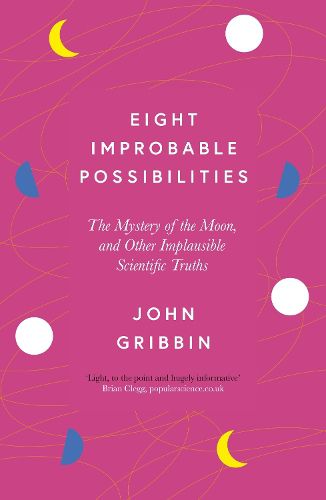Readings Newsletter
Become a Readings Member to make your shopping experience even easier.
Sign in or sign up for free!
You’re not far away from qualifying for FREE standard shipping within Australia
You’ve qualified for FREE standard shipping within Australia
The cart is loading…






‘Gribbin casts a wide net and displays his breadth of knowledge in packing a lot into each chapter … a brief read, but one that may inspire readers to dig deeper.’ Giles Sparrow, BBC Sky at Night Magazine
A mind-warping excursion into the wildly improbable truths of science.
Echoing Sherlock Holmes’ famous dictum, John Gribbin tells us: ‘Once you have eliminated the impossible, whatever is left, however improbable, is certainly possible, in the light of present scientific knowledge.’ With that in mind, in his sequel to the hugely popular Six Impossible Things and Seven Pillars of Science, Gribbin turns his attention to some of the mind-bendingly improbable truths of science. For example:
We know that the Universe had a beginning, and when it was - and also that the expansion of the Universe is speeding up. We can detect ripples in space that are one ten-thousandth the width of a proton, made by colliding black holes billions of light years from Earth.
And, most importantly from our perspective, all complex life on Earth today is descended from a single cell - but without the stabilising influence of the Moon, life forms like us could never have evolved.
$9.00 standard shipping within Australia
FREE standard shipping within Australia for orders over $100.00
Express & International shipping calculated at checkout
‘Gribbin casts a wide net and displays his breadth of knowledge in packing a lot into each chapter … a brief read, but one that may inspire readers to dig deeper.’ Giles Sparrow, BBC Sky at Night Magazine
A mind-warping excursion into the wildly improbable truths of science.
Echoing Sherlock Holmes’ famous dictum, John Gribbin tells us: ‘Once you have eliminated the impossible, whatever is left, however improbable, is certainly possible, in the light of present scientific knowledge.’ With that in mind, in his sequel to the hugely popular Six Impossible Things and Seven Pillars of Science, Gribbin turns his attention to some of the mind-bendingly improbable truths of science. For example:
We know that the Universe had a beginning, and when it was - and also that the expansion of the Universe is speeding up. We can detect ripples in space that are one ten-thousandth the width of a proton, made by colliding black holes billions of light years from Earth.
And, most importantly from our perspective, all complex life on Earth today is descended from a single cell - but without the stabilising influence of the Moon, life forms like us could never have evolved.